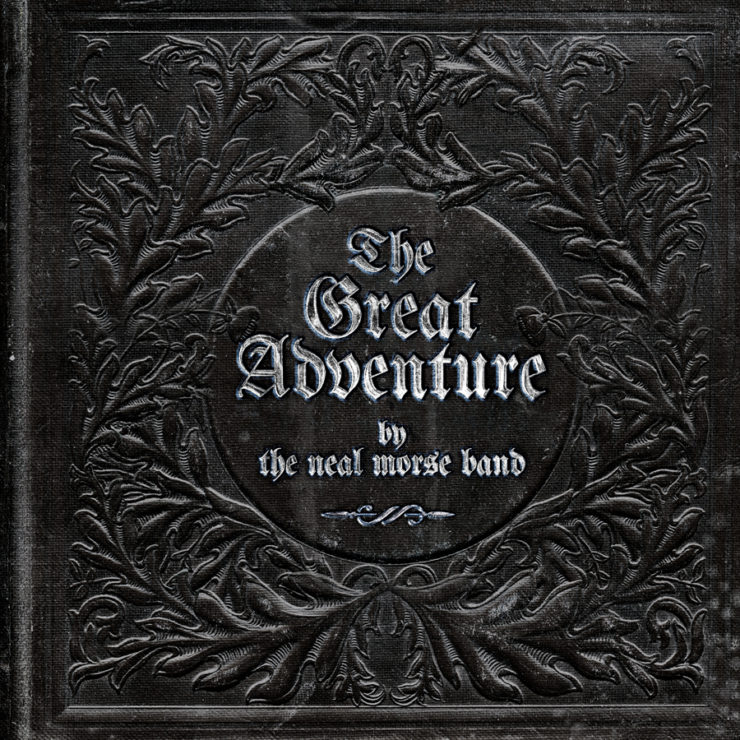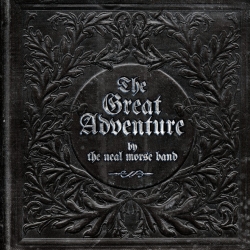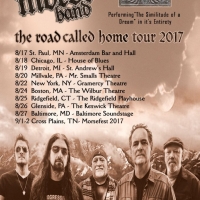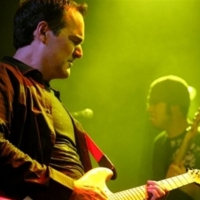It was never going to be easy for The Neal Morse Band—drummer/backing vocalist Mike Portnoy, keyboardist/vocalist Bill Hubauer, guitarist/vocalist Eric Gillette, bassist Randy George, and of course, guitarist/keyboardist/vocalist Neal Morse—to follow-up 2016’s The Similitude of a Dream. A sprawling conceptual opus based on John Bunyan’s The Pilgrim’s Promise, it still ranks as not only one of his crowning achievements (which is saying something considering the breadth of stunning work already in his arsenal) but also as one of the greatest American progressive rock albums of the decade. (Yes, it's grown on me quite a bit since my initial review.) That said, if any artist can outdo himself and surpass fan expectations, it’s Morse, and while the quintet’s brand-new continuation, The Great Adventure, doesn’t quite match its predecessor (and it wears some of Morse’s common issues on its sleeve), it comes immensely close. In other words, it’s a very worthy companion epic and another remarkable example of how the group’s chemistry as creators and friends yields virtually unmatched results in the genre.
Cleverly, the band alluded to this sequel at the end of The Similitude of a Dream, with the final line of “Let the great adventure now begin.” What’s always distinguished The Neal Morse Band is the democratically collaborative process through which all five players contribute to the songwriting, sequencing, and arrangements. In fact, they spent almost a year working on The Great Adventure (as the press release explains, this resulted in “some ruthless decision-making: some already completed songs and characters had to go, and—with studio time running out—new links and ideas were being composed and recorded up to the eleventh hour”). Above all else, that judicious dedication is a testament to their determination to do the narrative—now focused around “that of the Pilgrim’s abandoned son, a younger, perhaps angrier voice than was heard on The Similitude of a Dream”—justice. Like many outstanding records (especially in the realm of progressive rock storylines), it takes several listens to fully grasp, but once you do, you’ll be treated to a vastly emotional, hypnotic, and intricate journey.
Without spoiling too much, the first disc’s token opening overture picks up in media res to establish a direct link to its forebearer (kind of like how Ian Anderson linked the two Thick as a Brick LPs). The piece itself is exactly what you’d expect: an affective establishment of the guiding slogan—in this case, “A love that never dies”—before a thrilling onslaught of symphonic motifs delivered with masterful precision and cohesion. It’s common territory for the troupe by now, but damn if they don’t continue to pull it off faultlessly. From there, the first half of The Great Adventure makes good on its promise of an angrier affair with tracks such as “Dark Melody” and “Venture in Black” offering gorgeously moody music beneath foreboding confessions and taunts, respectively.
Naturally, there are brighter moments, too, such as the ingeniously simple but hooky “Welcome to the World” and “The Great Adventure,” two luminously complex singles that showcase how exquisitely Morse, Gillette, and Hubauer blend their voices. You can’t help but sing along with them, and the same goes for “Hey Ho Let’s Go,” a downright infectious pop/rock gem steered by Gillette’s youthful exuberance. Honestly, it’s one of the catchiest songs in Neal Morse’s entire multi-group catalog. Not to be outdone, Hubauer’s idiosyncratic timbre and stunning range close the first disc via the bombastically inspirational “Beyond the Borders.” To be clear, Morses still sings as well as ever, yet the increased usage of Gillette and Hubauer as equally able co-vocalists definitely adds essential color and changeability to make The Neal Morse Band a distinctive unit.
The second half of The Great Adventure kicks off with another feisty overture (albeit with slightly more playfulness and tonal diversity than the previous one) before “Long Ago” serves up a stirring acoustic ode to set-up the cathartic concluding sequence. In another great juxtaposition of ominous aggression and angelic optimism. Later, the acquainted textures and threatening temperament of “Fighting with Destiny” provide beguiling tension before Hubauer’s hypnotic falsetto chants (of “cardboard people”) surround Morse and Gillette’s carefree splendor—and some spoken word silliness—in “Vanity Fair.” It’s the most welcomingly atypical passage of the set (just as “The Ways of a Fool” was on The Similitude of a Dream), especially the unexpected carnivalistic frenzy at the finish that feels like the madcap lost section of a Devin Townsend or Diablo Swing Orchestra composition.
Afterward, Portnoy leads the more menacing and metal “Welcome to the World 2” (with backing help from the other vocalists, of course). As a singer, he knows his boundaries—no one would say he’s on par with Morse, Hubauer, or Gillette, and he never tries to be—so he uses his gruff limited range wisely here. As its name suggests, “Child of Wonder” is captivatingly dense, sentimental, and quizzical to evoke empathy for the titular protagonist, while Gillette’s ardent declarations, coupled with the central guitar riff, allow the subsequent “The Great Despair” to get under your skin (in the best ways possible). Predictably, the LP ends with “A Love That Never Dies,” a robust reprise and extension of the aforementioned motto complete with heavenly choral chants and embellished instrumentation. Once again, Gillette’s voice soars with engrossing ethos and pathos. It’s an obvious yet successfully impactful ultimate arrival for The Great Adventure.
As phenomenal as the full-length is, its main setbacks are, in a way, also its greatest strengths. Even the most diehard devotees agree that almost every Neal Morse album charts a very similar narrative/thematic/musical path, and this one is no different. Sure, all artists have their recognizable templates and traits (even the Beatles, who pushed new styles and methods on every collection), but it’s inarguably more transparent with Morse. In other words, he’s got a terrific formula—don’t get me wrong—but it’s a very familiar and specific formula nevertheless. Likewise, there’s a bit too much conceptual continuity (i.e., repeated themes) here. Yes, it’s a staple of the genre to have reimagined refrains, and I certainly love when melodies, lyrics, and the like reappear throughout a work, but it’s a tad excessive in this case. Too large a percentage of The Great Adventure consists of the same melodies, arrangements, and words in altered states (take a shot of alcohol every time someone sings, “a love that never dies” on the first disc alone and you’ll be inebriated by the end), which wasn’t the case for The Similitude of a Dream, let alone past Morse works like The Whirlwind, Snow, or the two Testimony projects.
Gripes and teasing aside, The Great Adventure is extraordinary in every way and further cements The Neal Morse Band as one of the best acts in modern progressive music. As always, the songwriting, musicianship, and overarching flow is second to none (even if it’s not as fresh as it could be), and the heightened emphasis on vocal variety makes it even more delightful from start to finish. In that way, The Great Adventure, like most Neal Morse albums, is the auditory equivalent of having repeated servings of your favorite meal: you essentially know what to expect every time, but that doesn’t stop it from blowing you away regardless.
The Neal Morse Band - The Great Adventure
 'The Great Adventure' cover
'The Great Adventure' cover
The Great Adventure is extraordinary in every way and further cements The Neal Morse Band as one of the best acts in modern progressive music.
Previous Review
Next Review
Comment
Browse By Category
Must Read
Fairmont Hit a Creative High With Everything Is Fleeting, a Reflective Indie Rock Standout 25 Years In
THE TAKEDOWNS FINALLY RELEASE LONG-LOST SELF-TITLED ALBUM ON VINYL AND DIGITAL
Father Mother Sister Brother Film Review
SELF TORQUE ANNOUNCE DEBUT ALBUM A BRUTAL NADIR, SHARE NEW TRACK AHEAD OF RELEASE
The Plague Film Review



